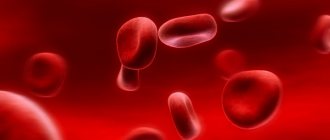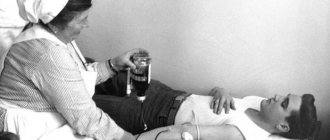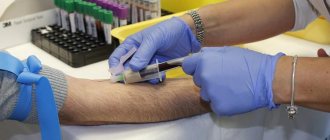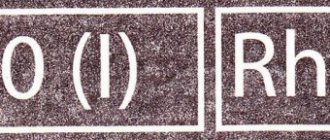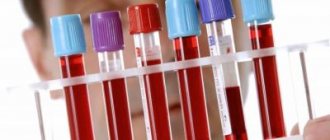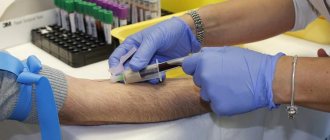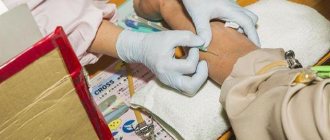0
Author of the article: Marina Dmitrievna
2017.10.08
61 280
Blood analysis
When it comes to characterizing blood type, people often indicate their Rh factor. It is this protein that plays an important role when a woman and a man are planning to conceive a child. However, the basis of personality characteristics is the blood type; the Rh factor is not able to influence the character or health of a person.
The main thing is that the second group was formed during the period of humanity’s transition to agriculture, when people gradually expanded their horizons, included plant foods in their diet, and became more sociable and developed. The change in the usual way of life entailed a modification of the qualitative composition of the blood due to the inclusion of other foods in the diet.
Group 2 (Rh -)
Blood group 2 with negative Rh is quite common, it cannot be called rare. The second group in terms of frequency of occurrence comes immediately after the first, to which 50% of all people belong. Negative Rh is found in only 15% of the planet's inhabitants, but this does not prevent people with this feature from maintaining their unique blood code.
How does group 2 affect the health of its owner?
Scientists have proven that it took 20 thousand years for a negative blood type 2 to form. The characteristics of women of this blood group are the same as men. If we take into account (Rh-), then the second group can potentially lead to the following diseases:
- Kidney failure;
- Pyelonephritis;
- Liver diseases;
- Urolithiasis disease;
- Allergy;
- Diseases of the throat, bronchi, nose, ears;
- Vascular thrombosis;
- Diabetes;
- Anemia;
- Rheumatism.
This entire list does not mean that these diseases must necessarily develop in a person with group 2 and negative Rh. The risks increase for those people who do not monitor their lifestyle. Nutrition can be called one of the decisive factors that can influence the health of the body.
Development of diabetes mellitus
The characteristics of negative blood group 2 do not end there, since this combination of blood type and Rh factor increases the risk of developing malignant blood diseases. This does not mean that all people with this blood type will become victims of such pathologies, but they have high risks if they do not monitor their health.
The influence of blood type on character
The versions of some scientists about the dependence of not only character traits, but also gastronomic preferences according to a person’s group are very popular.
You can partially determine who you are based on your character and diet by knowing your blood type.
It is noted that the owners:
- The first group is mainly meat-eaters and leaders with a tough and self-confident character,
- The second group is calm, easy to communicate, loves cereals and vegetables,
- The third are bright and eccentric fans of dairy products,
- The fourth are fairly omnivorous people with diverse interests.
Why is Rh negative dangerous for pregnant girls?
There is a golden rule that before directly conceiving a child, you need to check the health of both the expectant mother and father. 2 negative blood group in a woman during pregnancy becomes an additional risk factor. However, it happens that a woman finds out her Rh negative factor only after becoming pregnant.
Blood test for a pregnant woman
Ignorance of the mother about the Rh factor of the blood, her own and the child’s father, can lead to the death of the latter in the womb. This happens if the mother's Rh does not match the fetus' Rh. The mother’s body simply begins to reject it, as it considers it a foreign body. The body produces antibodies, which trigger this destructive process.
Important! This situation can occur if the mother has (-) Rhesus, and the child has (+). In the opposite situation, the conflict does not arise due to the fact that the child does not have an antigen to which antibodies would be produced. When two parents have equally positive or equally negative blood groups, then there will be no rhesus conflict either.
The (+) Rh group can be passed on to the child from the father, which is very bad if the mother has negative blood. It is necessary to monitor this even at the stage of preparation for pregnancy. If such a conflict is possible, you need to seek help from doctors. If this is not done, then early miscarriage, abortion, or development of hemolytic disease in the child is possible.
To avoid Rh conflict, the mother needs to undergo special blood tests that can detect antibodies in her blood. In order to prevent such a protective reaction of the body in time, at the 28th week of pregnancy a woman is given an injection of immunoglobulin, which will help block the development of antibodies.
Parental blood compatibility is one of the important aspects of health testing before pregnancy. The importance of such an analysis should not be diminished, because not only the health of the mother, but also the life of the unborn child depends on it.
Is blood type inherited?
The ABO system has provided enormous research opportunities for genetic scientists. It has been proven that a baby's blood type is formed from parental genes, according to previously discovered (in the 19th century) laws of inheritance. The blood group is determined by one of the gene variants (A, B, O) located on chromosome IX.
Genetic determination occurs according to a multiple principle, when the same gene in different variants acts independently of each other and to an equal extent. When these genes are combined in pairs, then the future one of the four species is determined.
Forensic medicine widely uses this system in controversial issues of establishing paternity or maternity and poses even more complex problems in the future.
What foods are best not to eat?
The second blood group and negative Rh were the result of people switching to eating mainly food of plant origin. It is easier for the digestive system of such people to process plant foods than animal foods. It's all because of the history of the development of this group.
Diet by group
At the dawn of their formation, after a long period of eating only meat, people began to include more agricultural products in their diet. Therefore, meat began to be included in the diet in smaller quantities, which led to changes in digestion.
Group 2 (Rh-) was formed precisely at this stage, so modern people should take this into account.
Recommended products that have a beneficial effect on the health of people with the second negative group are:
- Dairy and fermented milk products;
- All types of vegetables and fruits;
- Soy;
- Cereals;
- Beans;
- Various types of cereals;
- Dietary poultry meat;
- Low-fat fish varieties;
- Juices;
- Green tea.
A diet based on such foods can improve health, as they will ensure the normal functioning of the digestive system. People with group 2 (Rh-) should remember that excessive consumption of red meat, fatty and heavy foods will provoke the development of diseases of the gastrointestinal tract, liver, kidneys, heart and blood vessels.
During pregnancy 2, a negative blood group in women means a diet that is based on dairy and fermented milk products, vegetables and fruits. Simple combinations of foods of plant origin will help a woman endure pregnancy more easily, but meat should not be completely excluded.
The health of people with a negative second blood group is negatively affected by the use of:
- Pork;
- Sahara;
- Bakery products;
- Black tea;
- Fatty dairy products.
Eating too much flour, sugar and fat is bad for everyone, so these foods should be minimized in your daily menu.
Group in women during pregnancy
During pregnancy, such women may experience a number of problems . But only if the partner does not match the physiological characteristics.
In terms of blood groups, there can be a discrepancy with a partner who is a carrier of the third (BB) blood group and the fourth (AB).
This happens because the structures of their red blood cells contain protein B, which is foreign to the second group - carriers of only protein A.
The first group and the second are absolutely harmless for a woman with AA indicators, because in the first there are no antigens at all, and in the second they are completely identical. In any case, incompatibility between groups does not pose a great danger to the baby’s health. Thanks to the capabilities of modern medicine, pregnancy occurs safely and the child is born healthy.
But in case of Rh incompatibility, there can be serious problems, including miscarriage and intrauterine death of the fetus.
The fact is that a mother with negative Rh does not have Rh antigen in the structure of her red blood cells , and a baby in whose blood it is present will be regarded by the mother’s body as a dangerous foreign inclusion. In this case, we can draw an analogy with a virus or bacteria that has entered the blood. The immune system will react in the same way.
Rh positive can be passed from father to child, so when planning a pregnancy it is very important to learn about this data and assess the possibility of an unfavorable outcome.
The first pregnancy, as a rule, proceeds normally.
That is, there will be no direct rejection of the child . This is due to the fact that a woman’s immunity from the very moment of conception reflexively decreases so as not to reject the fetus, which is a parasite in a physiological sense. Antibodies against the baby's Rh proteins will accumulate slowly and reach their maximum towards the end of pregnancy. Sometimes this can lead to premature birth. But they are not so dangerous and, thanks to the capabilities of modern medicine, premature babies survive. The period of prematurity in these cases is always insignificant.
The situation is more complicated when there is a second pregnancy , and the child again inherits a positive Rh. In this case, the mother’s body already has an immune memory and will react instantly with strong rejection. This condition is fraught with miscarriage and intrauterine death of the baby.
Even in the presence of negative Rh in the mother and positive in the child, cases of a favorable outcome of not only the first, but also the second pregnancy have been recorded. Each case is individual.
The second negative group in men makes them universal fathers.
They are suitable for both women with positive and negative Rh.
Why know your group?
Every person on Earth needs to know their blood counts. Blood type and Rh factor are two features of the body on which in some cases our lives and the lives of people who need help depend, for example, after bleeding.
At a minimum, there are three moments when life depends on knowing your blood type:
- In case of emergency blood transfusion;
- For donation;
- In preparation for pregnancy.
Parental compatibility
Before getting pregnant, a girl and a guy should check their compatibility, because this will help determine the prognosis of a future pregnancy in time. The properties of blood cannot change during life; they remain forever.
It is appropriate to determine the group and rhesus immediately after the birth of the child. The result obtained may be indicated in a medical record or passport, which is especially important for people who have mental or memory problems. Not everyone knows whether the proposed donor material is suitable or not, so before transfusion, doctors are required to conduct an analysis of the group and Rh factor.
Everything about blood groups: origin and influence on humans
Blood has undergone many thousands of evolution, and the structure that we have now is a complex result of the transformation of all body systems, best suited for the modern lifestyle.
Historically, the origin of blood groups looks like this.
50 thousand years ago, all three human races already lived on Earth - Negroid, Caucasoid and Mongoloid, and they were all united by the first, oldest blood group, and there was no other - they were formed through thousands of years of mutations later from the primary group.
The digestion of ancient people was subordinated to a rough protein diet, and their increased acidity of gastric contents successfully digested large amounts of meat, so even today’s carriers of the first group have stomach ulcers more often than others.
In Europe, there are most carriers of the second group, and during times of terrible epidemics, the largest percentage of survivors were among the owners of the A gene.
After 25-30 thousand years, people were forced to develop crop production. The mammoths disappeared, and people began to cultivate the land, became more peaceful and accommodating, and gradually plant foods became the main element of nutrition.
The reconstructed digestive tract contributed to the origin of the second blood group, the so-called “vegetarian”.
People with II(A) turned out to be more adapted to life in densely populated regions; they have strong immunity and social qualities.
Another 5-7 thousand years later, the population in Africa and Europe increased so much that people had to explore new territories : nomads remained without food for a long time, learned caution in unknown conditions, tolerance, and the ability to contact strangers.
Cattle breeding and the consumption of milk developed, which gave another impetus to the evolution of digestion and the origin of the third blood group.
Carriers of group 3 are characterized by patience, determination, and endurance.
The 4th blood group is the youngest according to the ABO system and the rarest (detected in approximately 6% of the population), resulting from a mixture of owners of the second and third groups. Its most characteristic feature is the presence of a stable immune status in its owners.
Blood group according to the ABO system, or a breakthrough discovery of the 19th century
Blood groups were discovered at the end of the 19th century, when they began to actively try to mix the red blood cells of some people with the serum of others. The observed reactions indicated that this does not happen successfully in all cases: sometimes sticking and formation of clots are observed, which cannot be allowed.
Upon further study of this phenomenon, two special substances were identified in erythrocytes - markers, which were each present in their own blood. Using this principle, scientists identified two more groups, and then a fourth, in which these markers were not present at all. This resulting system, which carries enormous informative value, was designated by the abbreviation ABO.
- Blood group 1 (I(0)) is characterized by the fact that there are no antigens on the surface of red blood cells
- Blood group 2 (II(A)) : only antigen A is present on the surface of red blood cells,
- 3 blood group (III(B)) antigen B is detected on erythrocytes,
- Blood group 4 (IV(AB)) is characterized by the presence of both antigens, A and B
This outstanding discovery, which became a breakthrough in both science and medicine, made it possible to save many people through blood transfusions, already having awareness of the possible incompatibility of patients and donors.
Universal patient according to the ABO system
How to determine the Rh factor
Blood is a biological fluid that contains a huge amount of antibodies and carries genetic information. The Rh factor is a special agglutinogen protein that is part of the blood. There is a distinction between Rh positive and Rh negative. The latter is detected in 15% of people in the world and means the absence of protein in the blood. In medicine, there is the ABO system, which is used to detect antibodies in human blood. The Rh factor is determined by one of the most significant antigens, D. If it is absent in the blood, then the Rh factor is negative. Today in medicine, this research in the laboratory is carried out very quickly and accurately. If, for example, blood containing this protein is transfused to a person who does not have it, then the formation of specific antibodies begins in the blood, which leads to the appearance of disorders called Rh conflict. Repeated injection of blood with incompatible Rhesus promotes agglutination of red blood cells and contributes to the occurrence of severe complications. That is why during transfusion, only blood with the same Rh factor is used.
The nuances of transfusion
Difficulties may arise during transfusion. The second blood group can only absorb the first (complete absence of proteins - antigens) and the second, which is completely identical to it. To antigens B of the third and fourth groups, an immune response can occur, which can even be fatal.
In addition, a negative Rh factor is very sensitive to Rh proteins and will only accept the same negative factor. Positive blood in this case will cause an agglutination reaction - blood clotting within the bloodstream. This condition seriously threatens human life.
Agglutination occurs as a result of an immediate immune response. Proteins - immunoglobulins, under the influence of T-helpers, actively attack invading antigens, clinging to them from different sides and forming immune complexes. These complexes are subsequently attacked by macrophages (monocytes), which devour them and dissolve them inside with special enzymes. The recipient's own blood begins to "devour" the donor's blood.
Even if most of the recipient’s blood is lost, and the donor’s blood exceeds it in volume, it is still the recipient’s blood that will act as a “devourer”.
Tendency to diseases and pathologies
Weak points in the body of people with the second group will be:
- The cardiovascular system;
- Gastrointestinal tract;
- Kidneys;
- Liver and bile ducts.
This implies the likelihood of developing similar diseases:
- Heart failure;
- Myocardial infarction;
- IHD (coronary heart disease);
- Vegeto – vascular dystonia;
- Hypertonic disease;
- Gastritis;
- Peptic ulcer;
- Inflammation of the bile ducts, pancreatitis;
- Pyelonephritis, etc.
In addition, there was a high tendency to develop disorders of the immune system.
This entails the inability to resist cancer cells. It is in people with this group that cancer most often occurs. In order to prevent them, one should actively strengthen the immune system, which resists cancer cells in the process of their formation.
Allergic reactions are also a consequence of impaired immune function, and this is another disease that often occurs in people with the blood type described above.
